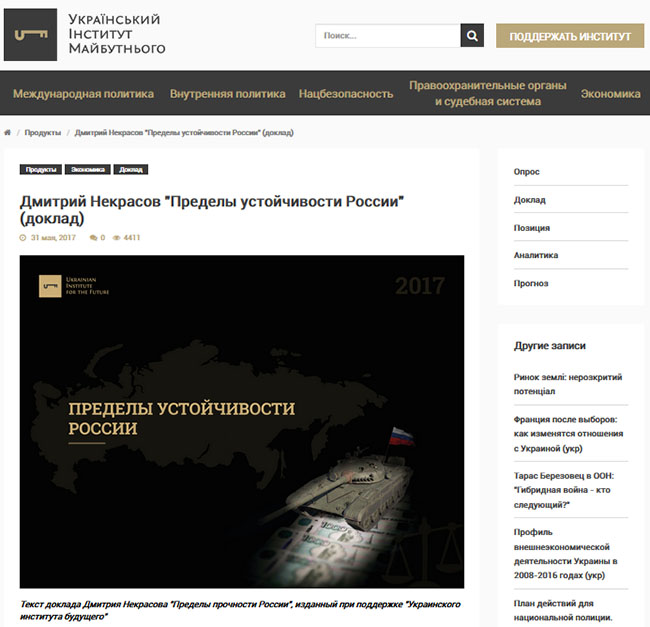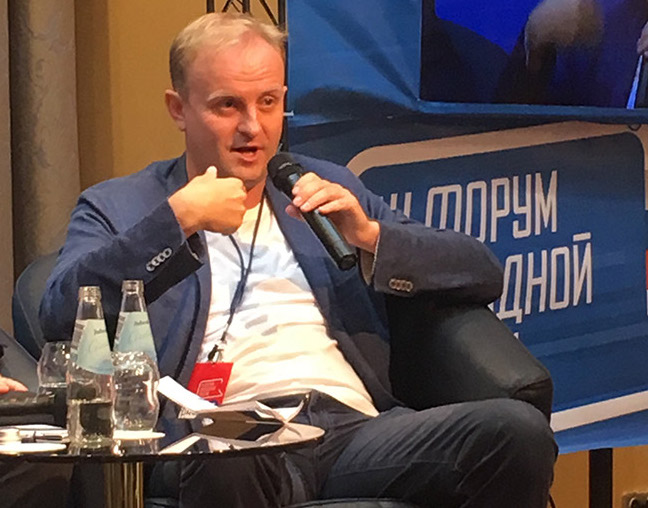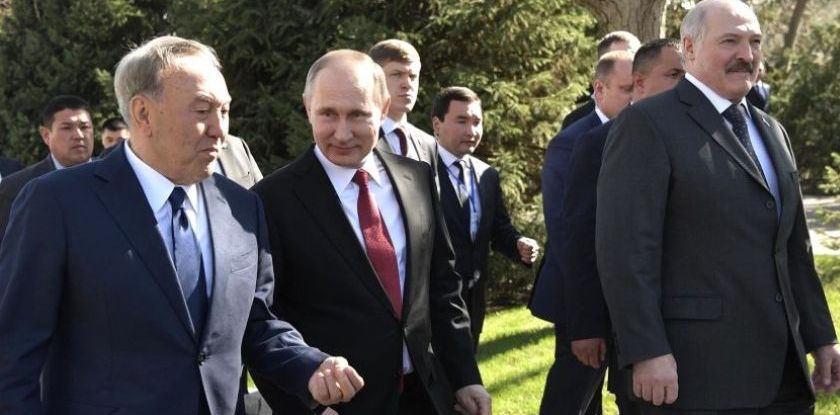The crisis is no longer a threat to Russia, so its neighbors should not count on this scenario. Instead, they must fight for a better quality of life in their own home. As the authors of the “Russia’s Stability Limits” report will have you believe, those who follow this strategy, eventually, are going to win.
The crisis in Russia is not going to happen, at least, in the foreseeable future. Despite the combined influence of the two negative factors – the economic sanctions and the decline of the oil prices – the Russian economy has managed to adapt to the new situation. Thus, the level of Putin’s support in the country has grown even more.
This shocking for the public policy and diplomacy conclusion can be found in the “Russia’s Stability Limits” report published by the Ukrainian Institute for the Future – an analytical center specializing in building different scenarios of Ukraine’s development.

The Ukrainian Institute for the Future was founded in 2016. There is absolutely no reason to consider it biased against the current government. Anton Geraschenko and Taras Berezovets who officially represent the governmental point of view are among the founders of the organization.
Moreover, it is hard to suspect Dmitry Nekrasov, the author of the report, of playing into the hands of the Kremlin. The former executive secretary of the Russian Opposition Coordination Council, he was going to run for the Russian Parliament with the support of “Yabloko”. Instead, he was forced to emigrate from Russia in May 2016 and move to Kiev.

The Ukrainian Institute for the Future’s mission is to predict the future of Ukraine, not Russia. The author of the report, however, understands that Ukraine’s future will depend on the strategic interactions with Russia. Moreover, judging by the researcher’s conclusions, the strong Russia is an imperative and the neighboring countries must take this factor into consideration when building their strategies for the future.
Nekrasov thinks that one of the main errors the international (and the Ukrainian) elites are making today is the belief that the economic situation in Russia is deteriorating dramatically and it is enough to just wait for some not very long time until Putin will be forced to make concessions or will be forced out be the Russian citizens.
Note that the political and even expert community of Kazakhstan is making the same mistake. Counting on the fast economic collapse of their Northern neighbor is now a condition for building a bright future of the country. The only we need is to follow the Chinese wisdom – sit by the side of the river and wait when the body of your enemy floats by.
But the body will not be floating. Nekrasov points out that, based on the statistical data, by 2017, the Russian economy, in general, had adapted to the sanctions and the low oil prices. As for the decline of the GDP, it stopped already in the fourth quarter of 2016. The ruble had grown by 31% compared to the peak heights of the beginning of 2016 and the stock indexes had increased by 35-40%.
And all this is not only due to the financial discipline of the Russian government that leans on the powerful vertical. The data shows that the growth of the stock indexes reflects the revitalization of investments that are outstripping the GDP. Therefore, they soon be reflected in the production release statistics and that same GDP as well.
So, the sanctions have failed to achieve the main goal – to stop the transfer of technologies that was usually performed through investments. This is the principal difference between Russia and the USSR. The latter was much more vulnerable in the face of the external shocks (although it is usually believed that it was the other way around).
The only evident goal the sanctions have managed to reach is the decrease of the level of life of the population. This happened, first of all, because of the fall of the ruble that, for the middle class, closed the access for the imported quality goods, and, second, as a result of the counter-sanctions that took many products away from the market. Besides that, the sanctions had de-facto closed the opportunity to visit the West for a large part of the state and quasi-state agencies’ employees.
Up until now, the Kremlin has managed to neutralize this serious problem thanks to its political initiatives. However, it is well-known that, if the fruits of the economic growth will not materialize in family budgets, they may turn out to be poisonous for the government. Dmitry Nekrasov believes that the situation in Russia will get worse if the stagnation takes place against the backdrop of the improving situation at its neighbors’ that have not endured the sanctions, especially the big ones such as Ukraine, Belarus, and Kazakhstan.
Thus, it turns out that, to win the geopolitical fight with Russia, one must act not by the way of war (either the direct or the hybrid one) but by improving the quality of life in their own country. And, if for Ukraine this seems a little utopic, for Kazakhstan, on the contrary, this may be the ideal strategy – for the resistance as well as for the basic survival.
As the emigration statistics of the recent decades shows, the quality of life indicators determine the number of emigrants. Some leave in search of a job, some – for pensions and social welfare. Especially since there are no real barriers for such movements. Therefore, there are no barriers for the reverse process, too. When the quality of life improves, people will return to the country with new professions and competences.




